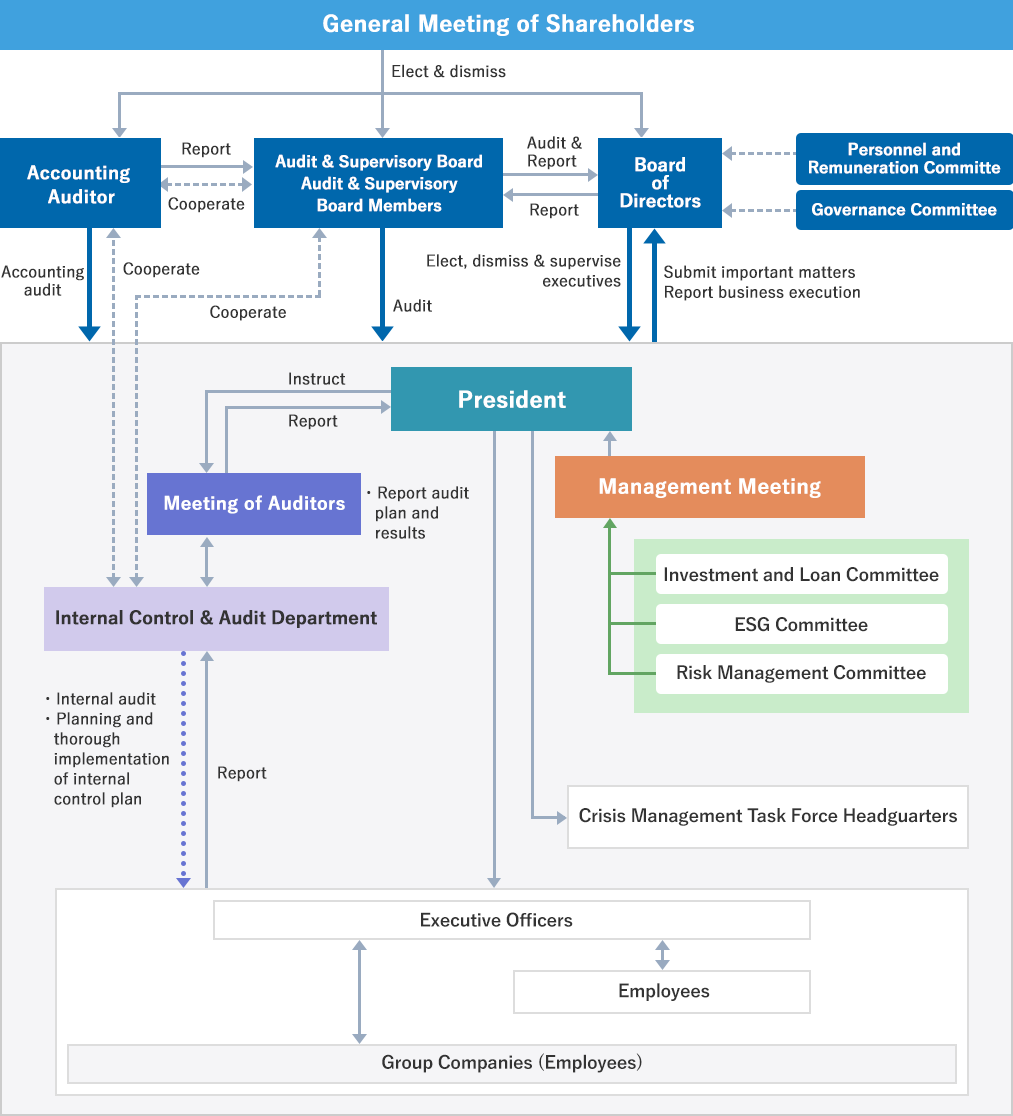Corporate Governance
The corporate governance of NIPPON STEEL TRADING CORPORATION("NST") is discribed below.
Basic Views
- 1.NST has established its "Corporate Philosophy," "Management Principles" and "Employee Code of Conduct" as follows, and its Directors, Kansayaku and employees strives to put them into practice in the daily management and business of NST.
- 2.NST endeavors to enhance its corporate governance based on the principles of the Corporate Governance Code in order to continue to implement the Corporate Philosophy, etc.
- 3.NST endeavors to achieve sustainable growth and the increase of its corporate value over the midto long-term through the continuous improvement of corporate governance under consolidated management.
- 4.NST has already resolved a "Basic Policy about an Internal Control System" at the meeting of Board of Directors. By operating this policy appropriately, NST further enforces its corporate governance, ensures "compliance with laws and ordinances," "reliability of financial reporting" and "effectiveness and efficiency of operations," and aims to improve it continuously.
- 5.In NST, the Board of Directors, which is composed of Executive Directors with thorough knowledge about the business and management of NST and two or more Outside Directors with a wealth of experience and deep insight in the area of corporate management, makes decisions about the basic policy of management and important business executions, and also supervises the execution of duties by Directors. Furthermore, Kansayaku who have strong authority attend the meeting of the Board of Directors and audit the business executions of Directors, etc., from an independent standpoint. NST judges that such structure is effective to ensure the efficiency and soundness of management, and adopts the governance system of a "Company with Kansayaku Board."
- 6.NST introduces the "Executive Officer System" and targets the efficient operation of the Board of Directors by separating the function of decision-making and supervision and the function of business execution, and adopts a system to promptly cope with changes in the management environment.
Overview of Current Corporate Governance System
NST ensures thorough implementation of the "Basic Policy About an Internal Control System" to further strengthen its corporate governance and endeavors to ensure, and continuously enhance, compliance, the reliability of financial reporting, and the effectiveness and efficiency of operations.
NST introduces the "Executive Officer System" and targets the efficient operation of the Board of Directors by separating the function of decision-making and supervision and the function of business execution, and adopts the management system to promptly cope with changes in the management environment.
- 1. Board of Directors
- The Board of Directors is organized by all Directors. Meeting of Board of Directors is held once every month. Important matters related to management are determined and the business execution of each Director is supervised.
- 2. Personnel and Remuneration Committee
- The appointment of senior management and the nomination of Director and Audit & Supervisory Board Member candidates are resolved at the meeting of the Board of Directors following the exchange of opinion in the Personnel and Remuneration Committee, which is composed of the President and three (3) Outside Directors. Each Director's remuneration is also resolved at the meeting of Board of Directors following the exchange of opinion in the Personnel and Remuneration Committee.
- 3. Governance Committee
- Basic policies and measures for the enhancement of corporate governance are discussed and reviewed by the Governance Committee, composed of the President, Director of the Corporate Planning & Administration Division, Outside Directors and Outside Audit & Supervisory Board Members, from abroad range of perspectives based on the Corporate Governance Code and other basic principles in preparation for the deliberation and discussion at the meeting of the Board of Directors.
- 4. Audit & Supervisory Board Members
- Audit & Supervisory Board Members attend important meetings such as meeting of Board of Director or Management Meeting to supervise the condition of business execution by Directors. Audit & Supervisory Board Members have the right to inspect all draft plans and reports on the database, claim Directors report in case of necessity, and state opinion at the meeting.
- 5. Accounting Auditor
- NST requests Deloitte Touche Tohmatsu LLC to execute financial audits in accordance with the Companies Act, and financial statements audits and internal control audits in accordance with the Financial Instruments and Exchange Act. The Accounting Auditor, Audit & Supervisory Board Members and Internal Control & Audit Department exchange information regularly and in mutual cooperation.
- 6. Management Meeting
- The Management Meeting is organized by Directors who serve as Executive Officers or Senior Advisors concurrently. It is held twice per month in principle. The policy of important business execution matters and other important matters related to management are discussed and the inquiries of the President are answered. Audit & Supervisory Board Members have the right to attend the meeting and give his/her opinion.
- 7. Establishment of various committees for the business execution system
- NST establishes various committees to act as advisory bodies for the Management Meeting with the aim of further promoting sustainability (corporate governance, etc.).
- a.Investment and Loan Committee
To investigate and examine investment and loan matters before the Management Meeting. - b.ESG Committee
To conduct a comprehensive and cross-organizational examination of basic policies and measures on issues related to the promotion of NST's ESG management.
The Environment Meeting, Society Meeting, and Governance Meeting are established as subordinate bodies. - c.Risk Management Committee
To manage risks faced by the Group in a comprehensive and cross-organizational manner and, with the aim of building a risk-resilient corporate structure, monitor the operation status of each risk management solution and identify and address new and existing risks across NST, so as to promote and establish risk management practices throughout the NST Group.
- a.Investment and Loan Committee
- 8. Internal Auditing
- The Internal Control & Audit Department is established as a department engaged in internal controls and auditing. It regularly audits validity and efficiency of business execution by NST and group companies in Japan and foreign countries.
The Department, when appropriate, reports to the Risk Management Committee risks that may have a material impact on the business of NST, works with various functional departments to provide support and guidance to mitigate such risks, and reviews the results of its activities through internal auditing.
Corporate Governance System of NST

Basic Views on Eliminating Anti-Social Forces
NST aims to continue to be a company group relied upon by society, and has the policy never to have a relationship with Anti-Social Forces which threaten public order and social safety, and to never meet unreasonable demands.
NST has already established an internal corporate structure such as the Compliance Manual and the assignment of a responsible person for unreasonable demands.
NST belongs to the particular association managed by the Metropolitan Police Department and receives instructions and information, and cooperates with outside special organs such as the police or lawyers, etc., in normal times.


